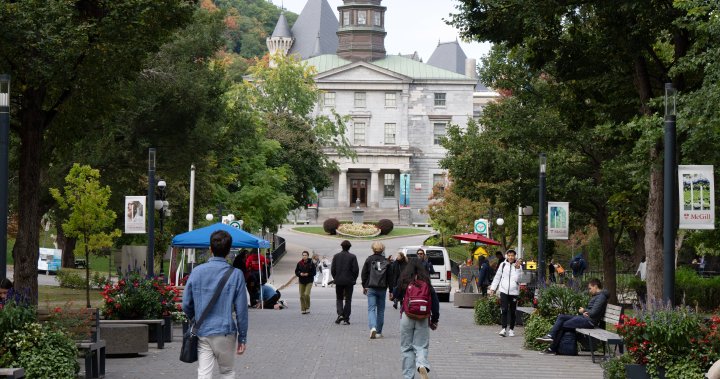When Gobindbir Singh describes the stress international students are under, he remembers a young man who called in tears.
Unable to pay his tuition for the upcoming semester, the student said his parents were selling their home in India and it still wasn’t enough.
He had asked friends to lend him money and tried getting an extension from the college.
Completely desperate, he turned to Khalsa Aid Canada.
“He literally cried over the phone,” said Singh, a project manager for the organization in Ottawa, which supports international students by providing free groceries once a month and winter coats.
“He said, ‘I have tried everything, and you are the last resort.’”
The story is one example of the difficult situations international students are finding themselves in as the cost of living skyrockets in Canada and it becomes more difficult for newcomers to find work.
These challenges have become more noticeable as the number of international students in the country has jumped in recent years.
In 2023, more than 900,000 foreign students had visas to study in Canada — more than triple the number from 10 years ago.
Post-secondary institutions and policymakers are facing significant scrutiny over the increase as colleges and universities increasingly use international student tuition to supplement inadequate government funding.
Meanwhile, more stories are surfacing of international students living in substandard housing and relying on food banks.
Singh, a former international student himself, said stress around finding work, paying for high tuition and adjusting to life in Canada can take a toll on a student’s mental health. Often, the students don’t know where to seek help.
Dealing with immigration issues or a family matter back home only makes the situation worse, he added.
Thushara Rodrigo, Sri Lanka’s consul general in Toronto, recently issued a warning to parents to stay informed about how their children are doing, after a 19-year-old Sri Lankan student was charged with killing six people, including four children, in Ottawa last week.
Financial news and insights
delivered to your email every Saturday.
Financial news and insights
delivered to your email every Saturday.
Police have not assigned a motive or divulged the circumstances that led to the attack.
Some of those who spoke with The Canadian Press were quick to caution that based on the limited information available now, it is difficult to draw any link between the horrific case and the general experiences of international students.
Rodrigo says he regularly hears from Sri Lankan students who are looking for help finding a job, and reeling from the shock of how much it costs to buy groceries and pay rent in Canada. That’s why he decided to put out the warning, he said.
He added that given Sri Lanka’s economic situation, there is “a very big demand” for people to emigrate, and families will mortgage their homes or borrow money to send their children to what they hope is a land of better opportunities.
The problem, he said, is the image painted by educational consultants hired to recruit and match students for schools in Canada.
He said the students don’t know how difficult it is to find a job and that if they find one, they will have to work late into the night — working as Uber drivers, for example — and wake up early for class after a 16-hour day.
“They are under severe pressure.”
Sri Lankan students ask for help looking for work, he said.
Sarom Rho from the Migrant Workers Alliance for Change said the root cause of the problem is that international students are not afforded the same rights and protections as permanent residents.
For example, international students cannot get public health care in most provinces.
“What this does is add an incredible amount of pressure and stress and sense of exclusion,” Rho said.
Students are also under immense strain to find work after graduation as they strive for permanent residency.
Narinder Singh said he’s noticed a disturbing trend: his Sikh temple in Surrey, B.C., has sent the bodies of 30 students back to India since 2021, and cremated around 15 others.
Some died by suicide and accidents, he said, but the majority died from drug overdoses as a toxic drug crisis ravages the province.
Singh, president of the Gurdwara Dukh Nivaran, said he believes one of the reasons students start using drugs is to deal with the mental distress of living in a place where they cannot afford housing or food, and to cope with loneliness.
“They had a different picture in their mind,” he said.
“When they came here, the situation is totally, totally different.”
Singh said he would not recommend that parents in India send their aspiring students to Canada.
His temple offers welcome packages for new students that include a mattress and other necessities. He said many families don’t send enough money for them to survive.
Jatinder Singh, the national director of Khalsa Aid Canada, said the need has been growing steadily over the past four years.
In Ottawa alone, the organization has some 920 students registered from 51 different countries.
A new phenomenon, he said, is hearing from parents who are searching for a missing child. He estimated at least one case comes across his desk a week.
“Invariably, what we find is that student has become unhoused or has become drug addicted, and is basically living on the streets or, you know, living in malls for as long as they can during the day and they’re not studying anymore.”
Singh blamed that on a lack of wraparound services for students.
“When they are having issues, there’s really no one to turn to.”
— With files from Nojoud Al Mallees




